On Farm Trials (OFTs)
Evaluation of newly introduced high yielding varieties of wheat at farmers’ fields.

Over All Impact
- Evaluvated variety (HD-2967) performed well as compared to DBW-39 followed by established variety (PBW-550).
- HD-2967 showed horizontal spread in 3000 ha. area of Lucknow district.
- Yearly saving of 600q improved seed through line sowing in Lucknow district
Evaluation of Organic Crop Production in Rice

Socio-Economic Impact
| Technology Option |
Yield (q/ha) |
% change in Yield |
Cost of Cultivation (Rs.) |
Gross Income (Rs.) |
Net Income (Rs.) |
B:C Ratio |
| Farmers Practice: Non-judicious use of fertilizers |
53.75 |
39500.00 |
|
98363.00 |
58863.00 |
2.49 |
| Use of CSSRI Bio-Product along with recommended dose of fertilizers |
57.25 |
6.51 |
38300.00 |
99278.00 |
60978.00 |
2.59 |
| Use of panchagavya and jivamrita along with recommended dose of fertilizers |
57.55 |
7.10 |
37200.00 |
99827.00 |
62627.00 |
2.68 |
Over All Impact
- Farmers realized the facts of demonstrated technology. Yield of technology i.e. use of panchagavya and jivamritra along with recommended dose of fertilizers were 57.55q/ha fallowed by use of CSSRI Bio Product along with recommended dose of fertilizers (57.25 q/ha) and non-judicious use of fertilizers (53.75q/ha).
- Use of panchagavya and jivamrita along with recommended dose of fertilizers saved Rs.2300 per ha and Use of CSSRI Bio Product along with recommended dose of fertilizers saved Rs.1200 per ha in comparison to farmers practice.
- Use of organic products maintained the soil fertility and increased microbial consortia.
Enhancing crop intensification through crop diversification.
Over all impact
- Assessed cropping system i.e. Rice ( Narendra 97) - potato – wheat – Mentha performed better in comparison to farmers practices i.e. Rice-Wheat and Rice-Wheat-Mentha.
- Cropping intensity of Lucknow district is 158%, while the assessed technology enhanced to 400% cropping intensity.
- Cropping system i.e. Rice ( Narendra 97) - potato – wheat – Mentha has now been cultivated in 100 ha area of Lucknow district.
Evaluation of drudgery reduction and efficiency of mango harvesters for picking of mango
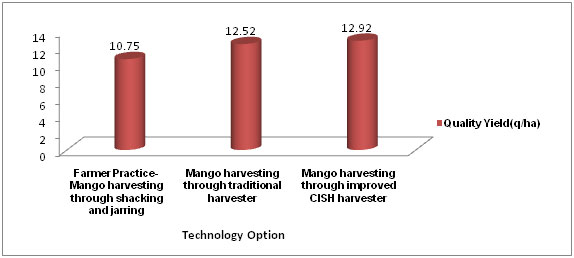
Impact of different mango harvesting technologies on different part of body
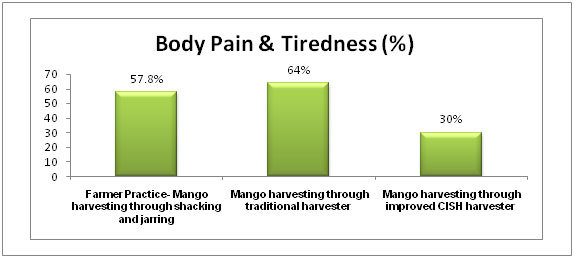
Over All Impact
- Minimum harvesting losses in mango harvesting through improved CISH harvester was 2-3%, while these losses in traditional harvesting and shacking & jarring were 3-5 and 25-30%, respectively.
- In context to drudgery in way of body pain and tiredness, it was minimum in mango harvesting through improved CISH harvester (30%), while it was 64 and 57.8 % in traditional harvesting and shacking & jarring, respectively.
- Cost benefit ratio of mango harvesting through improved CISH harvester was 1:4.0, while traditional harvester and shacking and jarring were 1:3.5 and 1:3.36, respectively.
- 5% orchardists of Lucknow district used improved CISH harvester for harvesting of mango.
Management of Leaf Webber in mango orchards
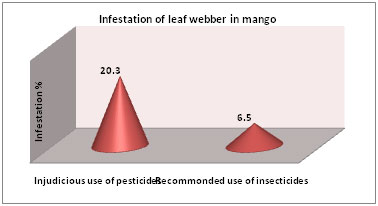
Over All Impact
- Recommended use of insecticides i.e. spray of Quinalphos 25 EC ( @ 2.0 ml/lit) and Lamda Cyhalothrin 5 EC (@1 ml/lit) at 20 days interval were found most effective and economical.
- Non-judicious use of insecticides increased the cost of cultivation and showed residual effect of pesticides on fruits.
- Recommended use of insecticides saved Rs.3500/ ha.
- This recommendation applied in 500 ha area of Lucknow district.
Availability of fruits & vegetables from nutritional kitchen garden.
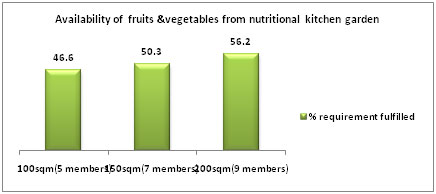
Over all impact
- The recommended requirement of vegetables per day is 2100g for 7 members (average farm family size), out of this on an average 1750 gm/day vegetables were supplied through nutritional vegetable gardening, Per capita income of farm families varied from Rs. 2650 to Rs. 3140. Farm families spent about Rs.10.00 -12.00/day for purchasing of vegetables after incorporating these modules. A sum of Rs.4500-7250 was saved in house hold income. It improved the livlihood and nutrational security of villagers.
- Nutrational kitchen garden adopted by 110 farm women of Lucknow district.
Evaluation of organic farming in Potato
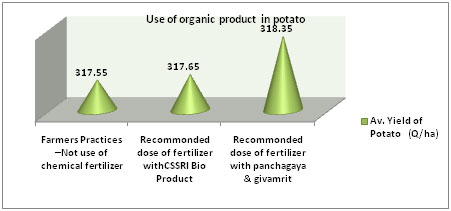
Over all impact
- Production of potatoes using organic products improved soil fertility and increased microbial consortia.
- It reduced cost of cultivation by Rs.4500 per ha.
Effect of green fodder availability round the year on milk production
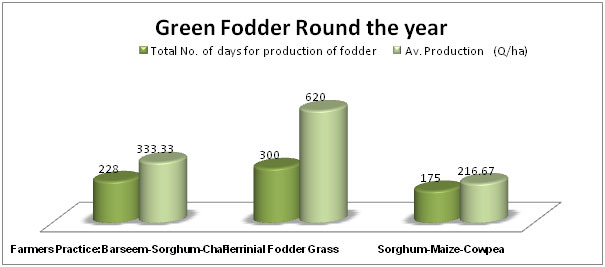
Over all impact
- Perennial fodder grasses provided approximately 300 days green fodder as compared to farmers practice.
- Perennial fodder grasses grown in125 ha area of Lucknow district.
- About 300 q green fodder was available in lean period which increased milk production to 125 liters in a year.
- Field Visits : 19 farmers group from different scheme (ATMA, NHM and RKVY) visited at KVK, Indian Institute of Sugarcane Research, Lucknow. During the visit, they have seen different technologies of sugarcane crop, jaggery and khandsari processing unit, Krishi Vigyan Kendra, vermicompost unit and developed implements related to sugarcane cultivation. KVK personnel also visited to450 farmers’ field of Lucknow district to solve the agriculture problem at field level.
- Agro Advisory Services: 570 agro advisory services provided to solve the farmers quarries who visited or on telephonic conversations.
- Kisan Mela : A kisan mela was organized at Indian Institute of Sugarcane Research Lucknow on 15-17 February 2014. About 825 farmers attended the Kisan Mela. Technology exhibition stalls of different research organizations, manufacturers, KVKs and line departments were also demonstrated in Kisan Mela. The visiting farmers saw various exhibitions stall and interacted to learn the knowhow on technologies being demonstrated.
- Kisan Gosthi : Four kisan gosthi were organized on protected cultivation, IPM in horticultural crops, Dairy management and Value addition of different horticultural crops were covered. About 350 farmers were participated.











